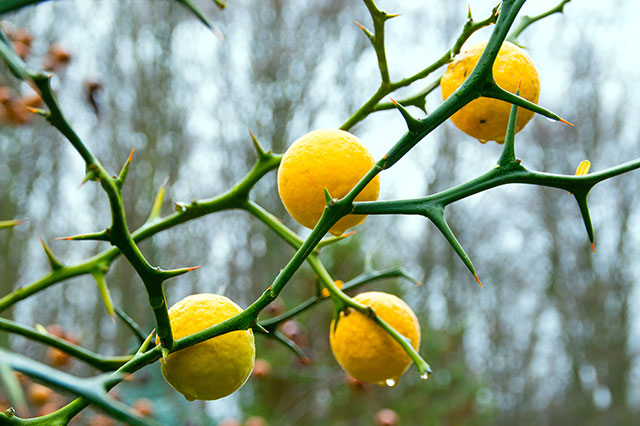Eat more trifoliate oranges to keep your prostate healthy
10/26/2018 / By RJ Jhonson

Compared to younger individuals, older men are at a higher risk of developing benign prostatic hyperplasia (BPH) or an enlarged prostate. A study published in the journal BMC Complementary and Alternative Medicine reveals a compelling reason for men to eat trifoliate oranges, as extracts from the fruit were proven effective in preventing the onset of BPH and cease its progression.
The trifoliate orange (Poncirus trifoliata), also known as the hardy orange, is a citrus fruit native to China. It is grown in parts of Europe and the U.S. for use in jellies, marmalades, and jams despite its notoriously bitter taste. It has been used as an ingredient in Traditional Chinese Medicine since ancient times, and current studies have shown its importance in maintaining prostate health.
As the word “benign” in its name implies, BPH is relatively harmless. In fact, some consider it a normal part of the aging process among males. It can, however, be extremely inconvenient as its symptoms can make the vital act of urinating difficult. It can also cause a constant feeling of needing to pee even at night; in most cases, sufferers may find themselves unable to sleep properly because of this particular symptom.
The researchers in the aforementioned looked at the trifoliate orange as a possible treatment for BPH. In particular, the study investigated the extract from Ponciri Fructus (PFE), the young fruit of the trifoliate orange, and its protective effects on the development of the BPH.
In the study, the researchers induced BPH in a rat model by injecting testosterone propionate (TP) and corn oil every day for four weeks. PFE was administered via oral gavage at a dose level of 200 mg/kg, one hour before these injections over the same duration.
At the end of the study, the rats were sacrificed and examined for markers of BPH. Specifically, the researchers took note of relative prostate weight, the levels of testosterone and dihydrotestosterone (DHT), common factors influencing the development of BPH. Histological changes, the expression of proliferating cell nuclear antigen (PCNA), and the activities of antioxidant enzymes (catalase, glutathione peroxidase, glutathione reductase, and superoxide dismutase) were also examined.
The researchers paid close attention to the inhibition of 5?-reductase – responsible for the conversion of testosterone to DHT, a process which, when uninhibited, can lead to BPH – in the prostatic tissue.
At the end of the study, the researchers noticed reductions in relative prostate weight, the level of testosterone and DHT in serum and prostatic tissue, prostatic hyperplasia, and the expression of PCNA. They also noted higher levels of antioxidant enzymes.
PFE demonstrated slight inhibitory activity on 5?-reductase, which is similar to the action of prescription medications for BPH.
The researchers concluded that PFE had antiproliferatory and antioxidant properties that prevented the development, as well as the worsening of BPH. For this reason, it may be employed as a therapeutic agent against the condition. (Related: Prostate Cancer – Discover five scientifically proven tips and prevent it naturally.)
Other tips to keep the prostate healthy
The prostate is a vital part of the male reproductive system, so keeping it in good shape contributes to overall health. Besides making trifoliate orange extract part of their diet, men can also follow the tips below:
- Maintain a healthy weight – Obesity is a precursor to many health conditions, including BPH.
- Keep fruits and vegetables in one’s diet – These food items are rich in antioxidants that keep the cells healthy and help prevent the onset of many diseases, including those that affect the prostate.
- Quit smoking – This bad habit does more than harm the lungs; it is a risk factor for many other diseases ranging from mildly adverse to actually deadly.
- Have more selenium – This nutrient is crucial to preventing and lowering the risk of prostate cancer. Some excellent food sources are sunflower and sesame seeds, beef liver, and seafood.
Learn of other ways to maintain prostate health naturally at Remedies.news.
Sources include:
Submit a correction >>
Tagged Under:
This article may contain statements that reflect the opinion of the author
RECENT NEWS & ARTICLES
COPYRIGHT © 2017 SUPER FOODS NEWS





















